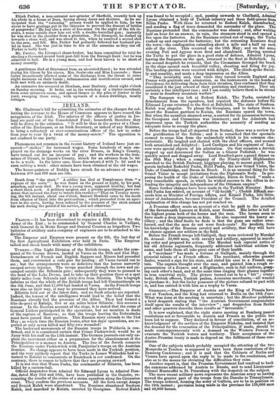IRELAND.
Mr. Gladstone's bill for submitting the estimates of the charges for col- lecting the revenue to the House of Commons appears to have roused the antagonism of the Irish. The salaries of the officers of justice in Ire- land are paid out of the Consolidated Fund ; henceforth therefore they will be down in the estimates. "It will be thus in the power of a Chan- cellor of the Exchequer, or an Irish Secretary, or indeed of any Minister, to bring a refractory or over-conscientious officer of the law to order from year to year by a twist of the money-screw." The opposition is not confined to one party.
Phenomena not common in the recent history of Ireland have just oc- curred—" strikes" for increased wages. Some hundreds of men em- ployed on the drainage works on the river Brusna, in Log's County, have turned out for an increase of pay ; and the workers in the iron- mines of Dysart, in Queen's County, struck for an advance from 78. 64. to 9s. a week. In the latter case, those discontented with 7s. 64. used to earn nothing a week : other miners have been obtained at the old wages.
The house-painters of Dublin have struck for an advance of wages : between 400 and 500 men are idle.
Death from "the stock." A soldier has died at Templemore from "a rupture of the aorta" : he was found on the ground at night, by his post, senseless, and soon died. He was a young man, appeared healthy, but had a short thick neck. A military surgeon and a private practitioner gave evi- dence that induced the Jury to return this verdict—" That on Tuesday morn- ing, the 6th instant, about one o'clock, Samuel Henfield came by his death from effusion of blood into the pericardium ; which proceeded from an aper- ture in the aorta, having been induced by the pressure of the stock around his neck during the period of his service, and not otherwise."


























 Previous page
Previous page